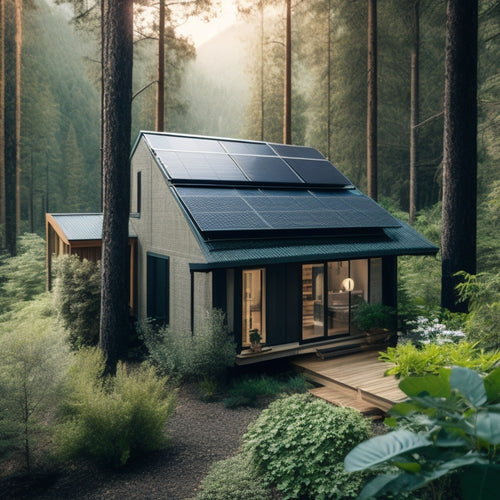
7 Tips for Off-Grid Home Solar Power
Share
When designing an off-grid home solar power system, you'll want to start by evaluating your energy needs through an audit to identify inefficiencies and usage patterns. Then, choose the right solar panels by balancing efficiency, durability, and budget. Select a suitable inverter that's compatible with your system voltage and power output, and calculate your battery bank size based on daily energy usage. Consider energy storage options, implement energy efficiency strategies, and monitor system performance regularly to optimize energy production and storage. By following these essential tips, you'll be well on your way to achieving energy independence, and understanding the complexities of each step will be vital to a successful change.
Key Takeaways
- Assess your energy needs by conducting an energy audit to identify inefficiencies and usage patterns for optimal solar array sizing.
- Choose the right solar panels by balancing panel efficiency, durability, and budget for maximum energy conversion and reduced installation costs.
- Select a suitable inverter that ensures compatibility with system voltage, power output, and frequency, and evaluate daily energy usage and roof space.
- Size your battery bank accurately based on energy storage needs and daily power usage, considering battery chemistry and depth-of-discharge limits.
- Implement energy efficiency strategies, such as conducting energy audits, investing in energy-efficient appliances, and utilizing smart technology for monitoring and controlling energy usage.
Assess Your Energy Needs
Your energy-hungry appliances and gadgets are waiting to be powered, but before you start sizing your solar array, you need to know exactly how much energy you'll need to generate.
To determine your energy needs, conduct an energy audit to identify inefficiencies and analyze your usage patterns, including peak hours and standby power consumption.
Calculate your total energy consumption by identifying the devices you'll be powering and their respective energy requirements.
Analyze your usage patterns, including the duration and frequency of use, to get an accurate estimate.
Make a list of all your appliances, lighting, and electronics, and note their wattage ratings.
Add up the total wattage to determine your peak power requirement.
This calculation will help you determine the size of your solar array and guarantee it can meet your energy demands.
Choose the Right Panels
When selecting solar panels for your off-grid home, you'll want to take into account three key factors.
You'll need to balance panel efficiency, which affects how much power you can generate, with durability, which impacts the system's long-term reliability.
Additionally, you'll need to weigh these considerations against budget-friendly options to guarantee your system stays within your means.
Panel Efficiency Matters
Twenty-five years ago, the average solar panel efficiency was around 10%. Today, you have access to more efficient panels, which is essential for off-grid home solar power. Efficient panels maximize energy conversion, reducing the number of panels you need to install. This, in turn, minimizes shading effects, reduces installation costs, and lowers environmental impact.
| Efficiency Range | Description |
|---|---|
| 15%-18% | Standard Efficiency, suitable for most off-grid homes |
| 18%-20% | High Efficiency, ideal for small or shaded roofs |
| 20%-22% | Premium Efficiency, recommended for maximum energy production |
| 22%-24% | Top-of-the-line Efficiency, for extreme energy independence |
| 24%+ | Innovative Efficiency, for ultimate grid independence |
When choosing panels, consider your energy needs, roof size, and budget. Higher efficiency panels may cost more upfront but provide long-term benefits, including reduced panel maintenance and performance degradation.
Durability Is Key
Reliable solar panels form the backbone of a successful off-grid home solar power system. You need panels that can withstand harsh weather conditions and last for years to come.
When choosing the right panels, consider solar panel longevity and weather resistance. Look for panels with a durable frame, tempered glass, and a weather-tight seal to guarantee they can handle extreme temperatures, heavy snow loads, and high winds.
A durable panel will minimize maintenance and guarantee consistent energy production. Don't compromise on quality – invest in panels with a proven track record of performance and reliability. This will give you peace of mind and a reliable source of off-grid power for years to come.
Budget Friendly Options
You don't have to break the bank to get started with off-grid home solar power. There are budget-friendly options to choose from when selecting the right panels for your system.
Consider exploring solar grants, community resources, and local incentives that can help offset the cost. You can also look into secondhand equipment or DIY installations to save money.
Additionally, take advantage of tax credits and crowdfunding options to fund your project. Before making a purchase, conduct an energy audit to determine your energy needs and identify the most cost-effective solution.
Select a Proper Inverter
When it comes to selecting an inverter for your off-grid home solar power system, compatibility with your existing setup is key.
You'll want to choose an inverter that matches your system's voltage, power output, and frequency requirements. Think about evaluating your daily energy usage and roof space to determine the appropriate inverter size Energy Requirements, and make sure the inverter's DC input requirements align with your solar panel voltage range.
There are several inverter types to think about, including string inverters, microinverters, and power optimizers. Each has its own advantages and disadvantages, so it's crucial to research and compare their features.
Look for inverter features like maximum power point tracking (MPPT), surge capacity, and remote monitoring capabilities. Reflect on the inverter's efficiency rating, durability, and warranty as well.
Size Your Battery Bank
You'll need to accurately size your battery bank to guarantee it can store enough energy to meet your daily power demands.
To do this, you'll need to calculate your battery capacity based on your energy storage needs and daily power usage.
Battery Capacity Calculation
Properly sizing a battery bank is a critical aspect of designing an off-grid home solar power system, as it directly impacts the system's overall performance and reliability.
When calculating battery capacity, you'll need to take into account your load forecasting, which involves estimating your daily energy usage. This will help you determine the total ampere-hours (Ah) required from your battery bank.
You'll also need to take into account the battery chemistry, as different types have varying depth-of-discharge (DOD) limits. For example, lead-acid batteries typically have a 50% DOD limit, while lithium-ion batteries can safely discharge up to 80%.
Energy Storage Needs
Now that you've calculated your battery capacity, it's time to determine the energy storage needs of your off-grid home solar power system.
When selecting a solar battery type, consider energy storage technologies that align with your system's requirements. Look at charging cycles, discharge rates, and maintenance requirements to guarantee seamless system integration.
Consider the lifespan of your chosen batteries and their environmental impact. A thorough cost analysis will help you weigh the benefits against the expenses.
Don't forget to implement essential safety measures to prevent overheating, overcharging, or electrical shock.
Daily Power Demands
To accurately size your battery bank, it's vital to determine your daily power demands, which involve calculating your total daily energy consumption in watt-hours (Wh).
This calculation helps you identify your peak usage periods and allows for energy conservation measures. Consider system redundancy to guarantee you have a buffer against power fluctuations.
Effective load management involves understanding seasonal variations in your energy needs. By making lifestyle adjustments and optimizing your appliances, you can reduce your overall energy consumption.
Be prepared to adapt to changing energy demands and adjust your system accordingly. Accurate calculations will help you size your battery bank correctly, assuring a reliable and efficient off-grid solar power system.
Consider Energy Storage Options
With your off-grid solar power system generating electricity, you'll need a way to store excess energy for later use, especially during periods of low sunlight or at night.
You have several battery types to choose from, each with its own advantages and disadvantages. Deep-cycle lead-acid batteries are a popular choice for off-grid systems, offering a long lifespan and relatively low upfront cost.
Lithium-ion batteries, on the other hand, provide higher energy density and longer solar longevity, but are more expensive.
When selecting a battery type, consider systems with advanced tech that promotes sustainable living sustainable living solutions and real-time monitoring that optimizes usage.
Consider your energy needs, budget, and maintenance preferences when selecting the right battery type for your system.
Properly sizing your energy storage system will guarantee you have a reliable source of power when the sun isn't shining.
Plan for Energy Efficiency
Across your off-grid home, energy-efficient appliances and lighting can greatly reduce your overall power consumption, allowing your solar power system to recharge your batteries more quickly and ensuring a reliable source of energy when you need it most.
To optimize energy efficiency, consider the following strategies:
| Strategy | Description |
|---|---|
| Conduct energy audits | Identify areas of energy waste and prioritize improvements |
| Implement passive design | Optimize solar orientation and insulation upgrades for natural heating and cooling |
| Invest in appliance efficiency | Choose energy-efficient appliances and lighting to reduce power consumption |
| Utilize smart technology | Monitor and control energy usage with smart devices and renewable incentives |
Monitor Your System Performance
Your off-grid home's solar power system is a complex network of components working together to generate, store, and distribute energy.
To guarantee it's running efficiently, you need to monitor its performance regularly. This involves system diagnostics and performance tracking to identify potential issues before they become major problems.
You can use data monitoring systems to track your energy production, consumption, and storage. This data will help you optimize your system's performance, identify areas of inefficiency, and make adjustments to maximize your energy independence.
Frequently Asked Questions
Can I Install Solar Panels on a Metal or Tile Roof?
Installing solar panels is like adding a crown jewel to your roof; you'll want to guarantee a secure fit. You can install solar panels on metal or tile roofs, but consider the roof's material, age, and condition for a compatible and secure installation.
How Often Should I Clean My Solar Panels?
You'll want to clean your solar panels every 6-12 months, depending on your location's climate and pollution levels, as part of regular solar panel maintenance to guarantee peak energy production and extend their lifespan.
Will My System Still Work During a Blackout?
While the grid fails, you'll remain powered, thanks to your battery storage, but only if you're not grid-connected; in that case, your system will shut down for safety, but you can still access stored energy with the right setup.
Can I Add More Panels to My System Later?
You can expand your solar setup by adding more panels later, but ascertain they're compatible with your existing system; research system expansion options and solar panel compatibility to confirm seamless integration and ideal energy harvesting.
Do Solar Panels Void My Roof Warranty?
When you install solar panels, you're likely wondering if they'll void your roof warranty. Typically, they won't, but you'll need to make certain the installation is done correctly to avoid any roof warranty implications, so it's important to choose a reputable installer.
Related Posts
-

Solar Phone Chargers for Camping Essentials
Solar phone chargers are must-haves for your camping essentials, allowing you to stay connected while enjoying nature...
-

Top Portable Refrigerators for Camping Adventures
When you're camping, having a reliable portable refrigerator can make all the difference for keeping your food fresh ...
-

Off Grid Solar Batteries
As you shift to off-grid living, you'll rely on high-performance solar batteries to store excess energy generated by ...


